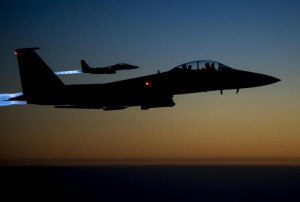
All of this, however, has a context and its meaning as well as implications can be understood accordingly. The current escalation started to happen following the US-led coalitions’ attack on the Syrian army base that resulted in 62 casualties. This so-called “mis-taken” air attack was followed, not simply coincidently, by a ground attack on the same base by the US-backed “rebels.” These attacks not only caused the fragile ceasefire agreement between Russia and the US to meet its demise but also led to a sudden escalation of conflict in and around the city of Aleppo. The new Russia-Syria offensive on Aleppo now, at this particular stage, has the potential to decisively turn the tide of events to their advantage, which would imply a clear defeat for the US, its allies and their jointly-backed proxy groups.
Let’s see what the re-capture of the city of Aleppo by the Syrian army would imply. It is clear to both the US and its allies that with the fall of Aleppo, the Syrian war would become a residual military operation to purge the al-Qaida affiliate Jubhat al-Nusra from Idlib province as well, which means regime forces would secure control over the entire populous regions of Syria, all main cities and the entire Mediterranean coast. In a nutshell, the fall of Aleppo to the Syria army would pave the way for an end of the war with President Bashar al-Assad ensconced in power.
It is, however, this very specter of “total victory” for Assad that continues to haunt the US and its allies and also explains, to a great extent, the string of vituperative statements against Moscow, displaying a high level of frustration.
While the US president Obama can order, theoretically speaking, missile attacks on the victorious Syrian government forces, but that will only add fuel to the fire. The Russian Defense Ministry has already warned the Pentagon that any US military intervention to remove Assad would result in “terrible tectonic shifts” across the region.
However, given that the situation is rapidly deteriorating to the US’ disadvantage in Syria, it is escalation, by both direct and indirect means, only that can salvage the US and its allies on the ground. While Russia understands the direction the US is wanting the war to go to, it should not fall a prey to deliberate provocation, although a measured response to this escalation is also a strategic necessity (read: Russian lawmakers have approved an indefinite stay of Russian forces in Syria and that Russia has upped its military strength in Syria).
While the US is explicitly engaged in warmongering, this is unlikely to translate, at any time, into direct military action. The US cannot undertake any such when its relations with two of biggest military powers in the region, Turkey and Saudi Arabia, have become quite volatile in the past few weeks. This being the situation, Moscow seems to factor in that the US may and will use some rebel groups to ensure that Russian “body bags” are sent to Moscow.
It has already become quite obvious to all of us that the US has been and is overtly supporting terror-groups in Syria. The latest evidence to this effect came in a recent interview given by an Al-Nusra commander to a German newspaper in which he acknowledged the US support for them. To quote him, “Yes, the US supports the opposition [in Syria], but not directly. They support the countries that support us. But we are not yet satisfied with this support,” told Jabhat al-Nusra unit commander Abu Al Ezz to Koelner Stadt-Anzeiger.
While this makes clear that co-operation between the US and Russia could never have taken place because of the US’ dual strategy and that peace cannot be recovered as long as such groups continue to receive support from the US and its allies, recent escalation by the US also makes it clear that the US does not treat these terror-groups as the primary enemy; for it, Russia and Assad remain the primary ‘enemies.’
This particular position explains the US’ official vilification of Russia and Syria for their “brutal” offensive in Aleppo and the so-called “war crimes” they have committed. This also explains why the ceasefire agreement was violated by the US and how the time was utilised by the proxy groups to re-organize and receive supplies of weapons to prepare for the next phase of fight that may take place not merely in and around Aleppo but may also involve Russia’s naval logistics facility in Tartus and the Navy’s task force as primary targets.
Salman Rafi Sheikh, research-analyst of International Relations and Pakistan’s foreign and domestic affairs, exclusively for the online magazine “New Eastern Outlook”.
